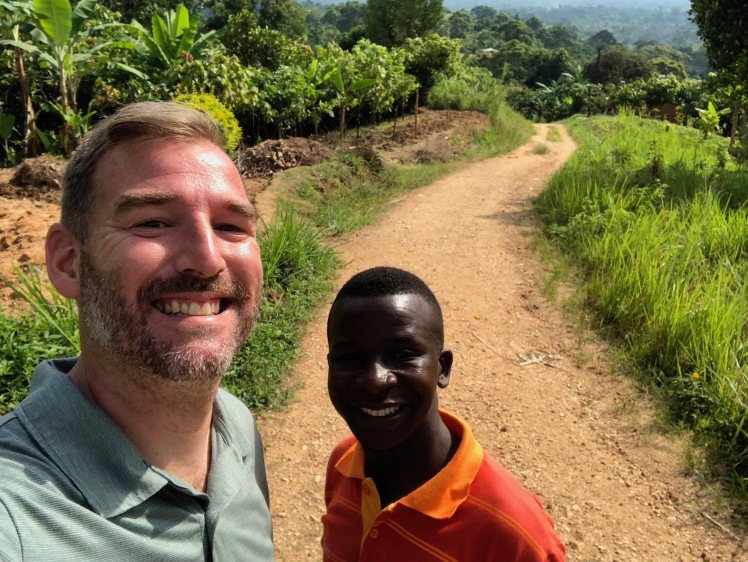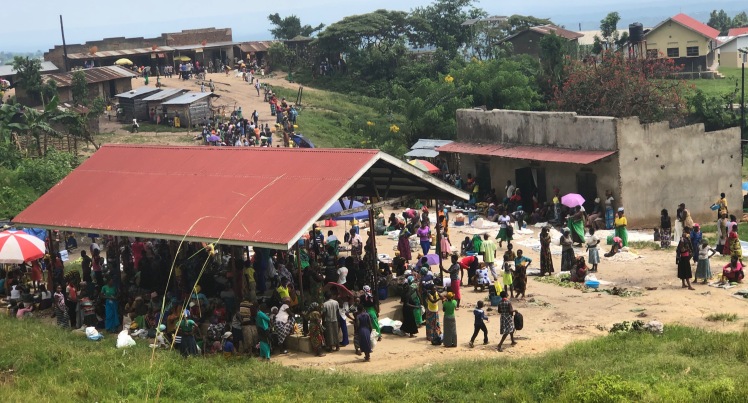
I woke up last Friday morning, grabbed my mug of black coffee, and watched videos of Minneapolis burning to the ground. I read, viewed news clips, reeled at the devastation that was wreaking havoc across America – the devastation of black lives at the hands, and knees, of white people. I finished my coffee and put it by the sink, then grabbed keys for the motorcycle and left the house. Passing by thousands of people and talking to many throughout the day, I did not see another white person for the next five hours until I came back inside my house.
My friend Benard, who teaches at CSB, planned a day for us to visit his family’s house, tour his village, and meet his good friend from childhood. We met up near the petrol station, and as we rode, him the guide in front and me the follower close behind, I enjoyed the beauty of different villages and the Rwenzori Mountains. But amidst the views I felt starkly the distinctions around me. I was the only driver for miles wearing a helmet. I was one of the only people wearing a mask, a COVID-19 presidential requirement in public. I wore Keens on my feet, and have blonde hair on my head. I am over 6 feet tall. When I got thirsty, which was often, I pulled a Nalgene bottle from my backpack and drank filtered water. To say I was different, other, would be an egregious understatement.
I pulled into the compound of Benard’s father about 20 minutes down the road (more like up the mountain). A large contingency of people ran out to greet me – his grandmother, father, stepmother, sister, nieces, nephews, neighbor kids. With a smile, I greeted them in the little Lubwisi I knew – “Olaayo … Mulimutya … Aga hani …” (Hello, how is everyone? How is here?) My friend led me into a small, mud-sided greeting room. We sat in green plastic chairs. We poured water on our hands to wash them, the overflow spilling onto the dirt floor. We drank tea with milk and sugar. We ate bananas and G-nuts and white bread. We talked, and listened; we shared stories from our lives for over two hours.
From there, we sat outside with the elders of the family – his father and brother. I gave his father a gift I had brought, 10 tea bags and two cups of sugar in a thin, plastic bag I had asked the seller to double bag for me so it wouldn’t spill into my backpack. We discussed the family tree, the trajectory of their family throughout the years and generations. His oldest son was in Kampala currently. He, the father, had previously been a police officer in Kampala and other districts but was asked to come home and take care of his extended family when his father died. I thanked him for raising such a great young man who is changing the community through his work at Christ School.
At one point, his grandmother came to thank me for coming and knelt on the ground, her knees only shielded from the hard dirt by the cloth from her old dress. She bowed her head to the earth and mumbled many thanks in Lubwisi. I responded, “Webale kusima” (Thank you for thanking me). She sat up and said something to which everyone laughed. Everyone except me. “What is she saying?” I asked. “She said that the girl over there wants to greet you, because she’s never met a mujungu before”. We all looked about 30 feet over to a group of kids and smiled. They were all giggling. I said, “Send her over, I want to meet her”. I couldn’t believe this 14 year old had never met a white person in her entire life. Later, the village leader would confirm that no white person had ever eaten at a house in their village before, ever.
When it was time to leave, the family rushed around looking for a panga (machete). Grandma started hacking at a long bamboo looking stick, about 10 feet tall. Turns out it was sugar cane. A grandson of hers brought a black backpack over to her. She chopped the sugar cane into footlong pieces and shoved as many as she could fit into the backpack. She added 4 avocados and 3 mangoes, then handed me the backpack and thanked me again for coming. What I had envisioned would be a brisk ride out to Benard’s house, and a quick Hello to his dad, turned into a 3 hour marathon with multiple generations of family.
We continued slowly up the mountain from there on our motorcycles. He introduced me to the LC1 (mayor) a few houses down. Just off the road, he showed me where his grandfather and great-grandfather were buried. We greeted all the neighbors and families for over a mile up the rutted dirt path. I met a primary teacher; saw countless children hoeing, digging, and playing games; laughed with a boy and his sister who had the widest, toothiest smiles I had ever seen. This was his home. This was his community. They knew each other deeply. They took care of each other completely. And they welcomed the outsider with open arms and open hearts.
We rode from there up a steep mountainside, through some avocado groves, past several brick-making properties, and a couple of abandoned schools. At the top was Butama, a fairly decent-sized village and market, teeming with people shopping and hanging out. We toured for a bit, with one guy on the corner yelling out loudly, “Nyahuka, Nyahuka!”. He seemed to be saying ‘They’re not from Butama!’ or maybe even a version of “American!”, since Nyahuka is the village where the Americans live. Either way, it felt much different than when we were in Benard’s village just a little ways away, amongst family and friends and neighbors. The stares intensified.

We sat under a tarped bench, in a booth of sorts, outside a small duka shop and drank Sky Dew sodas and talked about civics. I told him how beautiful his community was in so many ways, and that America is not so beautiful right now. Benard said he knew, that he sees and hears the news of cities being burned down in the U.S. He said that Kampala felt that way when he lived there, not because of the color of his skin but because of the many different tribes mixing there. And the fact that he was from very far away in Bundibugyo. He said that people are not always so welcoming, you don’t always really know your neighbor, and people are too busy trying to be successful to really connect with each other deeply.
We rode from there to Bubandi and met one of Benard’s good friends from childhood, Ham. Weaving our bodas through several small mud-thatched buildings we ended up at his office, adjacent to a two-building, 10-classroom primary school – that he had built. For about an hour I asked him many questions, heard his story, and got to know this man, at least a little bit. This man who went to university and earned a bachelors degree in social work. This man who serves and counsels HIV/AIDS patients at the local clinic. This man who saw the state of education in his village, knew that it was dismal, and did something about it. This man who decided that the children in his village needed a high-quality and a Christ-centered education – so he built a school! I was impressed by his ingenuity, entrepreneurialism and perseverance to bring about change in his community. He was a successful man who wanted to leverage his success to bless others and transform his village.
By the time I made it home, shortly after 2pm, I was exhausted, even though I’d mostly traveled by motorcycle. I saw white people again, my wife and children, waiting for me excitedly to play Pictionary when I arrived. But beyond just exhausted, I was also exhilarated. Meeting people so different from me, hearing stories of their lives, their humanity, and eating together – this is what we were designed for.
God is the God of community, who dwells communally as one God in three persons – Father, Son and Spirit. He is also the God who calls us into a family, into a community of believers. And also the God who calls us to go into all the world, to love our neighbor as ourself, to love our enemies, and to lay down our lives for our brothers. He’s ultimately the God who laid down Himself for those who hated him, who despised him, who needed him though they didn’t know it. He sacrificed Himself for you, and for me. He welcomes the outsider, every single one of us, into community. He welcomes us to feast with Him eternally, in community, alongside every nation, tribe, tongue, and skin color of the world.
Thanks Patrick for writing about your day with Bernard and his family and the other villages. What an adventure you had, and what an eye-opener! I can only imagine what that must have felt like. Knowing God loves them too and wants them to learn to love and serve Jesus too! Nana Iva
LikeLike